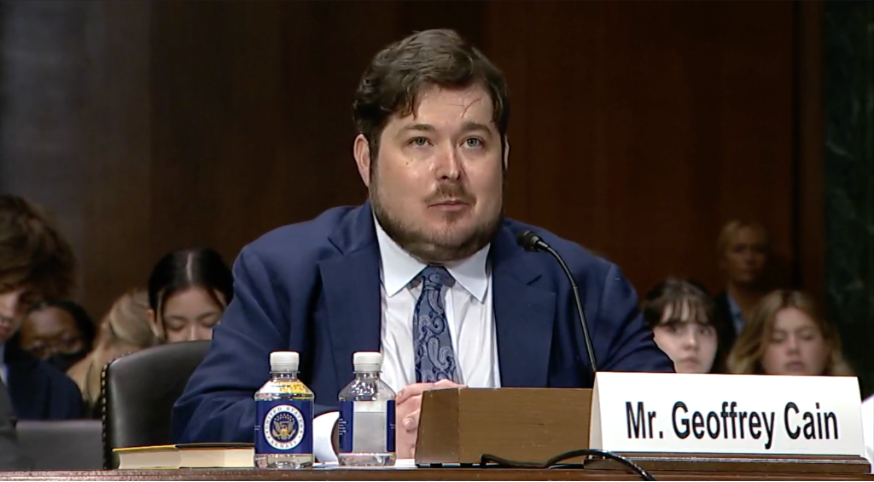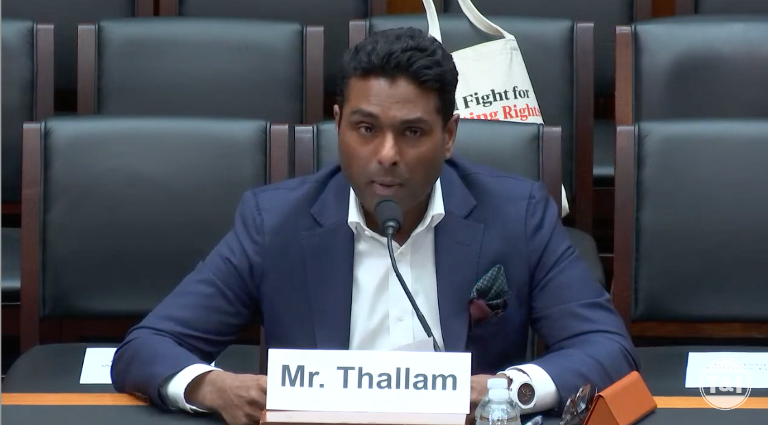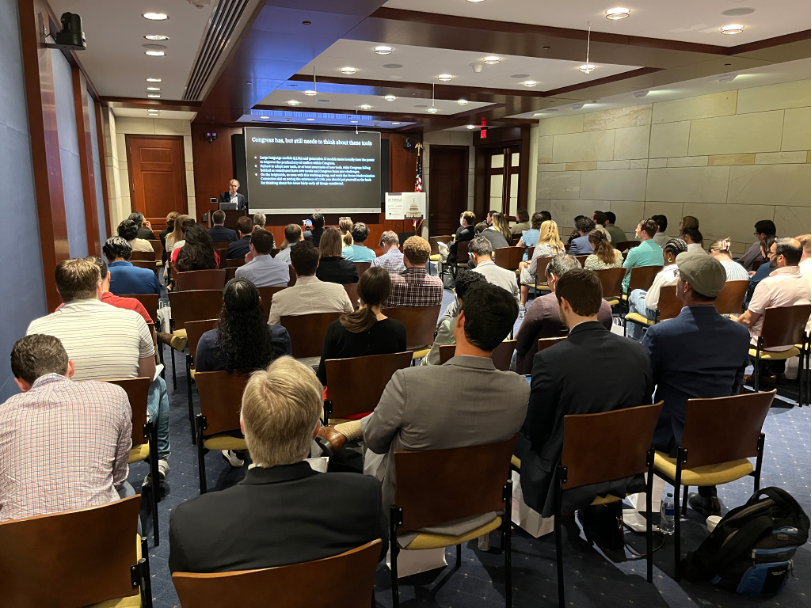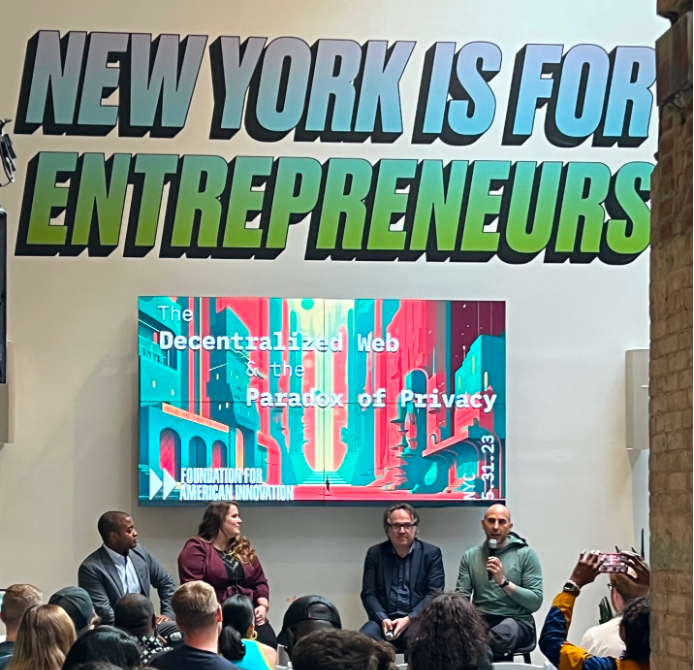
Dear friend of FAI:
I’d like to share with you some of our recent activities, including new analysis from the Research team, project updates from Labs, and other developments across the Foundation for American Innovation.
Of course, the biggest update is our new name: in April, Lincoln Network became the Foundation for American Innovation. With our influence and ambitions continuing to grow, our new name will help us convey to our audience of technologists, policymakers, founders, and politicos who we are and what our mission is.
But we’ve been up to much more than that. Take a look at what the FAI team has been working on over the last few months.
In May, we welcomed three new members to our board: Kmele Foster, Partner at Freethink/Big Think; Michael Kratsios, former Chief Technology Officer of the United States; and Tamara Winter, Commissioning Editor for Stripe Press. Additionally, to help with our expanding slate of events and operations, we recently welcomed our new Operations Manager, Allison Landis.
Research
Our policy team had a busy quarter, working to strengthen national security, improve American governance, and keep America at the forefront of technological dynamism. For a taste of our latest work, I especially recommend the recent appearance of Senior Economist Sam Hammond and Senior Fellow Jon Askonas on American Moment’s podcast, Moment of Truth, where they discuss AI’s potential and threats.
Reports, Testimony, and Comments
Head of Policy Dan Lips and Melissa Moritz, Senior Fellow at the Federation of American Scientists, published a report, “STEM and Computer Science Education: Reforming Federal K-12 Education R&D Activities to Strengthen American Competitiveness.” They argue that while there is significant federal activity aimed at improving STEM and computer science education, more can be done to ensure that this activity advances national goals. Dan and Melissa show that securing American economic and national security will require strengthening federal education R&D initiatives to ensure that K-12 STEM education is effective and widely accessible.
In the Spring 2023 issue of the New Atlantis, Jon continued his series, Reality: A Post-Mortem. In his latest essay, “What Was the Fact?” he considers the life and death of the fact and the dissolution of consensus reality.
Our team had two essays in the Summer 2023 issue of American Affairs. In “Common Sense on AI,” Jon and Sam offer a blueprint for policymaking that encourages innovation while protecting citizens from AI’s actual and potential harms. They demonstrate how U.S. regulators can navigate the Scylla of fearmongering about superintelligence and the Charybdis of shortsighted laissez-faire approaches.
In the same issue, Senior Fellow Geoff Cain published an essay, “North Carolina and the Regional Roots of American Industrial Strategy.” He examines the development of North Carolina's Research Triangle as a case study in industrial policy. Geoff argues that the current debates around U.S. industrial capacity must be informed by our historical success in fostering R&D hubs.
I published a report through the American Enterprise Institute’s Digital Platforms and American Life Project, “The Governance of American Innovation: Restoring Congress’s Role.” I discuss how the accelerating pace of technological change raises unique challenges for our governing institutions, which have struggled to keep up after years of calcification. I argue that the restoration of Congress’s absorptive capacity and legislative function will be essential for maximizing the benefits of new technologies and securing America’s continued leadership in innovation.
Dan and Satya Thallam, Non-Resident Senior Fellow, published another report, “Empowering Regulatory Oversight: How Congress Can Hold the Administrative State Accountable.” They discuss how the legislative branch has largely ceded control of regulations and the administrative state to the executive, and argue that Congress has not established the necessary legislative powers, expertise, and staff resources to oversee federal regulations. They offer recommendations for how Congress can strengthen its regulatory oversight capacity. The paper received a write-up in the Epoch Times.
Geoff testified in June before the Senate Judiciary Committee, Subcommittee on Human Rights and the Law for its hearing on “Artificial Intelligence and Human Rights.” He discussed how China uses AI to expand its security state, how American business elites helped make this happen, and how the U.S. can use its global technological leadership to protect democracy and human rights from China’s AI threats. The hearing was covered by Axios, Bloomberg Law, Fox, and many other outlets.

Satya testified before the House Committee on Transportation and Infrastructure, Subcommittee on Economic Development, Public Buildings, and Emergency Management, at its hearing on the National Emergencies Act. In his testimony, he considered the Act in the context of Congress’s impossible task of delegating effective but limited powers to the legislative branch in times of emergency, without knowing what or when the next emergency will be.

Non-Resident Senior Fellow Reynold Schweickhardt submitted a statement for the record to the House Committee on Veterans' Affairs, Subcommittee on Disability Assistance and Memorial Affairs and Subcommittee on Technology Modernization for their hearing on “The Future of VA Benefits Claims Processing.” Reynold discussed how the Department of Veterans’ Affairs can use IT and AI to improve service and lower costs.
We’ve also submitted several written congressional testimonies in recent months:
- Policy Technologist Lars Erik Schönander submitted written testimony to the House Committee on Appropriations, Subcommittee on Agriculture, Rural Development, Food and Drug Administration, and Related Agencies. He encouraged the Subcommittee to protect U.S. farmland and critical infrastructure from malign foreign influence by directing the Department of Agriculture to enforce compliance with the Agricultural Foreign Investment Disclosure Act of 1978.
- Dan submitted written testimony to the House and Senate Committee on Appropriations, Subcommittee on Commerce, Justice, Science, and Related Agencies. He called for directing the National Science Foundation to improve its reporting about the outcomes of its education R&D programs.
- In his written testimony to the same subcommittees, Sam called for funding the Department of Commerce’s Bureau of Industry and Security, so that it can fulfill its mission of “ensuring an effective export control and treaty compliance system and promoting continued U.S. strategic technology leadership.”
- Policy Counsel Jonathon Hauenschild and Director of Outreach Luke Hogg submitted written testimony to the subcommittees as well, encouraging them to provide appropriations sufficient for a short-term continuation of the Federal Communication Commission’s Affordable Connectivity Program.
- Dan submitted written testimony to the House and Senate Committee on Appropriations, Subcommittee on State Department, Foreign Operations and Related Programs. He called for funding the Open Technology Fund, an essential program for advancing global internet freedom and countering digital authoritarianism.
- Finally, in written testimony to the Senate Committee on Appropriations, Subcommittee on the Legislative Branch, Dan urged the Subcommittee to prioritize funding for the Government Accountability Office, a congressional watchdog agency providing significant taxpayer savings.
Sam submitted a comment in response to the National Telecommunications and Information Administration’s request for comment on AI accountability measures and policies. He argued that ensuring that powerful AI models are deployed in a trustworthy and accountable manner is essential to our national security and the future of humanity. Nonetheless, it is vital that the most stringent regulatory mechanisms be reserved only for the most powerful systems, especially ones that are yet to be developed.
Members of FAI joined 13 other organizations in signing a letter to Senators Maggie Hassan and Todd Young, applauding them for their ongoing leadership in the effort to restore full and immediate expensing for investments in U.S. research and development.
Dan also submitted a letter to Senators Bernie Sanders and Bill Cassidy, Chairman and Ranking Member of the Senate Committee on Health, Education, Labor and Pensions, offering input on policies that the Committee should consider during the reauthorization of the Education Sciences Reform Act.
We have many research projects in the works and look forward to publishing reports on the American drone industry, cybersecurity risks in U.S. ports, global internet freedom, and more in the coming months.
Commentary and Impact
Many policies that our scholars have advocated for saw progress this quarter.
Geoff and Lars have warned about Chinese state-owned companies owning U.S. farmland and called for greater oversight of land acquisitions by foreign entities. The House Appropriations Committee’s report accompanying the funding bill for the Department of Agriculture includes language addressing Lars’s recommendations, such as providing more resources to the Department to enforce the Agricultural Foreign Investment Disclosure Act. Florida recently banned Chinese entities and affiliates from purchasing farmland and land near military bases and other critical infrastructure, and Senators Joni Ernst and Debbie Stabenow have announced bipartisan legislation to improve transparency and oversight of foreign purchases of U.S. farmland.
Lars has written about the dangers of the U.S. government’s use of Chinese drones, especially from the company DJI. In April, Lars submitted written testimony to the House Committee on Appropriations, Subcommittee on Homeland Security, calling for prohibiting the Department of Homeland Security and its partners from using Department funds to purchase Chinese drones. Two months later, the Committee approved a bill stating that no funds appropriated by the bill can “be used to purchase, maintain, or continue to operate any Unmanned Aircraft Systems that are manufactured in the People’s Republic of China or a country identified as a foreign adversary.” Other positive developments include Arkansas’s ban on the use of Chinese drones by law enforcement agencies and other public entities, the U.S. Capitol Police’s announcement that it has stopped using Chinese drones, and Senators Marsha Blackburn and Mark Warner’s introduction of bipartisan legislation imposing funding and operating prohibitions on drones made in China and other countries.
We’ve been working to ensure that the rules governing the 118th Congress facilitate an effective and accountable legislative branch. Last fall, we published two reports with recommendations for reforming “the People’s House.” We were pleased to see that the recent draft legislative branch appropriations bill included some of our recommendations, including supporting an AI working group within the House of Representatives in its committee report. I recommended this working group in testimony submitted to the House Appropriations Committee in March.
For several years, we have recommended that the Government Accountability Office inform Congress of what the federal government could save if Congress and federal agencies enacted the nonpartisan watchdog agency’s open recommendations for improving government. In December, Congress included report language accompanying the omnibus spending bill requiring GAO to provide this estimate. Last week, GAO issued its report, estimating that implementing open recommendations “could produce $92 billion to $182 billion in financial benefits.” We have also encouraged Congress to require GAO to conduct more ongoing oversight of federal improper payments, which totaled $247 billion last year. In June, GAO published the second in a series of quarterly reports, required through 2025, answering a House Appropriations Committee reporting requirement.
Dan and Lars have warned about U.S. higher education’s vulnerability to foreign, and especially Chinese, influence. Florida recently prohibited state colleges and universities from officially accepting or soliciting gifts or grants from, or participating in partnerships with, colleges or universities based in countries of concern, including China.
Concerns about the Chinese app TikTok grow more widespread by the day, and with good reason, as Geoff has shown in his congressional testimony and writing. While many states have previously imposed bans on the app on government devices, Montana recently became the first state to ban the app outright.
More broadly, much of FAI’s work seeks to respond to the China challenge by promoting the union of tech entrepreneurship, domestic policymaking, and public diplomacy. We were therefore honored to brief the House Select Committee on the Strategic Competition between the United States and the Chinese Communist Party in advance of its May hearing on “How to Counter the Chinese Communist Party's Economic Aggression.”
Finally, former Senior Fellow Deepesh Chaudhari has recommended that Congress “leverage the technical capacity of GAO to conduct a technical analysis of AI and study the associated current and emerging risks.” Senators Ed Markey and Gary Peters recently took a step toward doing just that, asking GAO to produce a “detailed technology assessment” of AI risks.
Our commentary included the following:
- Geoff Cain, “The Left, TikTok, and the World’s Biggest Police State,” in Persuasion
- Jonathon Hauenschild, “Don’t Sacrifice the Fourth Amendment to Ban TikTok,” in The Hill
- Jon Askonas, “How Gamers Eclipsed Spies as an Intelligence Threat,” in Foreign Policy
- Sam Hammond, “We Need a Manhattan Project for AI Safety,” in Politico
- Luke Hogg, “Utah Makes Progress on Digital IDs for Citizens, with Blockchain Technology as a Bonus,” in the Salt Lake Tribune
- Jon Askonas, “Into the Tuckerverse,” in The Point
- Alex Dubin, “The Next Frontier in STEM Education,” in City Journal
- Geoff Cain, “Microsoft Issues Warning About Chinese AI That Microsoft Helped Create,” in The Dispatch
- Roslyn Layton, “How Big Tech Uses Net Neutrality To Subvert Competition,” in ProMarket
- Dan Lips, “Congressional Republicans Are Right to Fund Watchdogs and Committees,” in The Hill
- Roslyn Layton, “Standard General-Tegna at the FCC: Process or Prejudice?” in Next TV
- Luke Hogg, “To Compete with China, Promote Internet Freedom from Space,” in the National Interest
- Roslyn Layton, “The Debate on Small Dollar Loan Rate Regulation Is Far from Settled,” in the Square Center
- Lars Erik Schönander, “States Push Back against Chinese Drones,” in The Hill
- Jon Askonas, “Piety, Technology, and Tradition,” in Mere Christianity
- Roslyn Layton, “Zero Rating Is the Free Sample In the Internet Ice Cream Store,” in ProMarket
- Luke Hogg, “America Cannot Afford to Be like Europe in Regulating Artificial Intelligence,” in the National Interest
- Luke Hogg, “To Close the Digital Divide, Streamline Federal Funding,” for Broadband Breakfast
- Robert Bellafiore, “Beware the Technological Idiot,” in Providence
- Alex Dubin, “Boeing’s Starliner Saga Is Actually a NASA Policy Success,” in The Hill
- Dan Lips, “Congress Should Follow Its Watchdog to Cut Government Spending,” in National Review
- Roslyn Layton, “Benefits of ACP Extend Beyond People Who Subscribe to Broadband,” for Broadband Breakfast
- Luke Hogg, “Winning the Next Space Race”
- Jonathon Hauenschild, “Arkansas Social Media Safety Act Violates the First Amendment”
- Evan Swarztrauber, “Protect Kids, Not Big Tech’s Market Position”
- Luke Hogg, “The Latest Child Safety Bill Might Be the Worst”
- Roslyn Layton, “Letting China Dominate Legacy Chip Production Would Be a Catastrophic Mistake”
On his Substack, Second Best, Sam has been writing about OpenAI’s lessons for science policy, AI and language, and the possibility of an AI tragedy of the commons.
Highlights among our media hits included the following:
- Geoff spoke to Radio Free Asia’s Uyghur department about how America’s political divides influence its stance toward China.
- Lars spoke to The Wire about the risks of Chinese purchases of U.S. farmland.
- I spoke to Washington Monthly about the Government Accountability Office’s Science, Technology Assessment, and Analytics team and how it can boost Congress’s technical capacity.
- Geoff spoke to National Review about how the Chinese government is heightening its surveillance efforts against foreign journalists, especially those traveling to Xinjiang.
- Sam spoke to Politico about the challenges Congress faces in thinking about, let alone regulating, AI.
- Geoff was featured in a CNBC feature on “The Untold Story Of Samsung’s Growing Chip Business.” Geoff previously wrote the book on the topic: Samsung Rising: The Inside Story of the South Korean Giant That Set Out to Beat Apple and Conquer Tech.
- I spoke to the Washington Post about Silicon Valley’s efforts to inform congressional AI regulation.
Fellowships
In June, we completed our third cohort of the Policy Hacker Fellowship. Policy Hackers is a non-resident fellowship program for tech professionals looking to build expertise in the theory and practice of public policy. Over the year-long program, we teach fellows the fundamentals of policy entrepreneurship and innovation policy and introduce them to scholars, government policymakers, and public relations experts.
Labs
It’s been an exciting quarter for the Labs team. Our goal is to bring technology and creative partnerships to bear in solving critical, high-stakes problems facing our country, and we’re pleased to report on the success that our products are seeing.
Schoolahoop
Schoolahoop, FAI’s platform for school choice, made significant progress in its mission to help parents find the best options for their children's education. This project has been our team’s main focus for the last several months, and the effort has been paying dividends: user growth has increased more than 1,600 percent in 2023 year-to-year and continues to grow nearly every day, and we believe we’ve identified the best monetization strategy to make Schoolahoop self-sustaining.
Schoolahoop owes its growth, not just to our team, but also to our partners at School Choice Wisconsin and Step Up for Students, who have a deep understanding of how to launch in a new state and generate interest from schools and parents. Step Up for Students, our new “boots-on-the-ground” partner in Florida, has been a great resource for parents who want to talk to a local expert on the options for their children. We’ve worked with them to create a new feature for filtering schools by specific scholarships, so that parents don’t waste time searching for schools that don’t accept their children’s scholarships. Step Up for Students will also be adding Schoolahoop’s school finder feature to their website.
We’re looking forward to releasing new features in the coming months, thanks to a generous grant from the Bradley Foundation. We plan to add Spanish as a language option, and a new “Claim Your School” feature will empower schools to claim and update their Schoolahoop profiles, so that parents have the most up-to-date information. We’re also excited to be launching in West Virginia soon.
BIPBounty
BIPBounty is the first platform for crowdsourcing tax-deductible bug bounties for Bitcoin Improvement Proposals (BIPs). So far, more than 1.31 BTC has been donated towards the BIP-119 bug bounty program. We have exciting plans in the works for BIPBounty: we’re pursuing opportunities with Bitcoin founders and influencers to create tax-deductible ways of supporting Bitcoin R&D projects. We’re also aiming to add additional BIPs and other Bitcoin R&D projects to support the open-source development of Bitcoin. We’re looking forward to the next few months as we expand our reach in the crypto community.
Project Nickel
Project Nickel is FAI's platform for parents, journalists, and policymakers who want to see what public schools spend and where their money goes. We aim to improve transparency in K-12 school spending because we believe it should be easy for the public to know how much money is being spent by our public school system. We’ve focused this quarter on maintaining up-to-date spending data, and we’re actively looking for support to add a new return-on-investment feature that would allow anyone to compare spending on a per-pupil basis with educational outcomes.
If you or anyone you know is interested in partnering with Labs or have any inquiries, please don't hesitate to reach out to our Head of Product, Brandon Detweiler, at brandon@thefai.org.
Events
This quarter, we hosted events across the country with some of our favorite organizations and thinkers.
We hosted a salon dinner in San Francisco to discuss what AI means for human civilization and the paradoxes of accelerating technology amid aging democracies.

FAI collaborated with POPVOX Foundation and Demand Progress on a series of events about AI for congressional staffers. The events included a closed-door roundtable with senior staff and an open briefing on “AI Tools for Congress,” at which Lars presented on AI integration best practices and AI’s uses for congressional offices. The briefing received a write-up in Roll Call.

In May, we held a launch party to celebrate our new name with friends and colleagues.
Next, we hosted a panel discussion in New York about “The Decentralized Web and the Paradox of Privacy.” Media Fellow Marshall Kosloff moderated the conversation with speakers from Filecoin Foundation, Uniswap Labs, and Terranet Ventures, as they considered the challenge of balancing national security and individual privacy.

The next day, we held a private salon dinner in New York to continue the conversation in more detail.
In June, we joined several organizations for a reception in Washington, D.C. on why “Immigration Policy Is Innovation Policy.” Speakers from the Economic Innovation Group, AOL, Revolution, and SwipeSense discussed high-skilled immigrants’ contributions to the U.S. economy.
Other highlights among the events our scholars spoke at included the following:
- Jon joined Hudson Institute for a conversation on “Assessing the U.S. Military’s Force Structure.”
- Lars spoke to D.C. Legal Hackers about how to build open source tools with congressional data.
- Sam spoke at the Tax Equity Funders Network’s Shaping the Future Forum about AI’s potential to help with tax preparation.
- At a panel hosted by the Congressional Transparency Caucus, Dan discussed efforts in the 117th Congress to improve transparency throughout the federal government.
- Luke joined Braver Angels for a panel discussion on “Social Media Reform and Regulation to Reduce Polarization.”
Podcasts
On our podcast, The Dynamist, Senior Advisor Evan Swarztrauber brought on some of today’s most important thinkers and doers to discuss the future of technology, governance, and innovation. Recent episodes have featured Teleport.XYZ's Paul Bohm, the Niskanen Center’s Daniel Takash, and FAI’s own Jon Askonas.
Saagar Enjeti and Marshall Kosloff have continued hosting the podcast The Realignment, which is sponsored by FAI. They’ve had conversations in recent months with figures such as Senator Marco Rubio; Rohit Chopra, Director of the Consumer Financial Protection Bureau; Noam Bardin, founder and CEO of Post; and Jennifer Pahlka, former U.S. Deputy Chief Technology Officer and author of the new book Recoding America: Why Government Is Failing in the Digital Age and How We Can Do Better.
Book Recommendations
Finally, we’ve read some great books in recent months. Here are a few that members of the FAI team recommend:
- China Dream, by Ma Jian
- American Prometheus: The Triumph and Tragedy of J. Robert Oppenheimer, by Kai Bird and Martin J. Sherwin
- On the Marble Cliffs, by Ernst Jünger
- The Internet Is Not What You Think It Is: A History, a Philosophy, a Warning, by Justin E. H. Smith
- Inside Story, by Martin Amis
- Privacy in Context: Technology, Policy, and the Integrity of Social Life, by Helen Nissenbaum
- Mind: A Brief Introduction, by John R. Searle
- Dean Acheson: A Life in the Cold War, by Robert L. Beisner
- Liberty, Equality, Fraternity, by James Fitzjames Stephen
- The Chile Project: The Story of the Chicago Boys and the Downfall of Neoliberalism, by Sebastian Edwards
- Bismarck: A Life, by Jonathan Steinberg
- Emperor of Japan: Meiji and His World, by Donald Keene
- You Are Not a Gadget: A Manifesto, Jaron Lanier
You can also see a longer list of our recommendations on our Bookshop page.
Thank you for following our work. We appreciate your continued interest in FAI and welcome any questions or feedback.
If you’re interested in supporting our mission, you can donate here.
Sincerely,
Zach Graves
Executive Director
Foundation for American Innovation